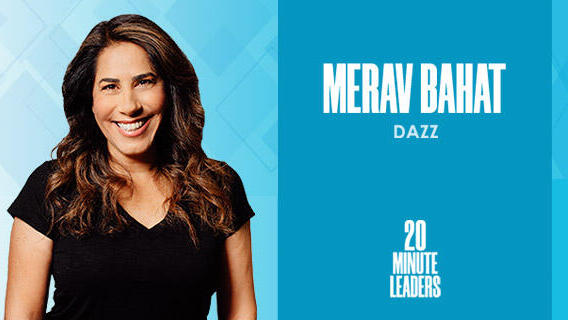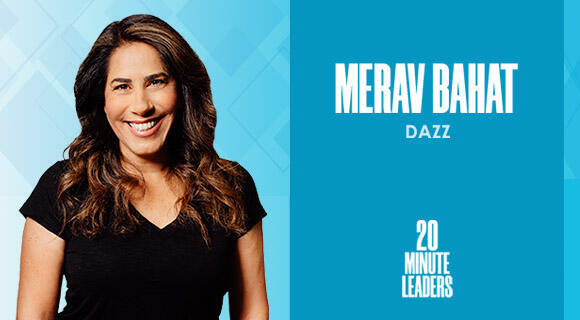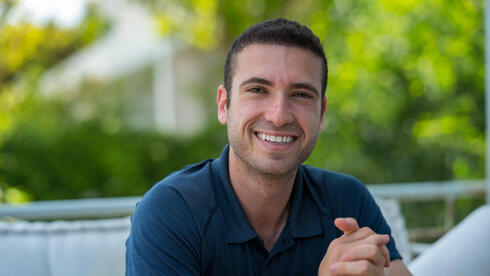
20-Minute Leaders
“If you have the right team and the passion to solve a big problem, it's an amazing journey.”
The journey to founding a company began with wanting to start from scratch building a team and culture, says Merav Bahat, co-founder and CEO of Dazz.
The journey to founding a company began with wanting to start from scratch building a team and culture, says Merav Bahat, co-founder and CEO of Dazz. While she enjoyed her other executive roles at tech companies, she often thought about how she would have done things differently at the beginning. After finding the right team and the right problem to tackle, she explains that she has had an incredible journey with Dazz. Bahat shares that Dazz is approaching security from a different perspective. She says the vision is to move past identifying risks to reducing risks. Also, there is often not enough collaboration between security and engineering teams, so their platform helps to bridge that gap as well as monitoring the entire pipeline from code to production. Bahat explains that she sees startups as a great place for female leaders to begin and grow to be CEOs of large companies.
Click Here For More 20MinuteLeaders
Merav, tell me a little bit about yourself and what you are excited about.
I'm very excited about what I do today. We started the company \[Dazz\] about a year and a half ago, and since then, I think every day has been more exciting than the other. Building and growing a company from zero: that was my passion. I actually didn't think it's possible for women to do that. When I started to do that and I got the best co-founders, since then, it was just an amazing experience. I'm motivated day-by-day by what we do.
You started out at the Technion and as an engineer by trade. Did you anticipate this as a career trajectory, that you were going to be an executive in technology roles and then starting your company?
When I was a kid, I actually grew in a periphery of Israel, so I didn't really have any role models, any women founders, CEOs. Every step, I dreamt of the next step. That was a journey. That's what I love in life: just follow your passion, dream your dreams, dream bigger, and try to execute them all. I started to think about starting my own company actually when I was VP products at Flash Networks. I went a year to Harvard for more school. I came back; I went to Microsoft. I didn't start my own company. But since then, it was like a bug. I really wanted to do that and find the right team and go execute my dream.
What was the trigger for you to go on this journey for yourself?
I was a VP product, and I felt very connected to what I did. But if I’d've done it from the beginning, I would've done it differently. I always had the passion to actually start fresh, get my own team, build a culture. There is a lot about the culture, about the people you work with, the problem that you want to solve, and then the execution. I think that was a great opportunity to start a company and recruit the team that you really feel are going to be your partners for the journey.
Now, we are 55 people, and I was actually interviewing each and every one of them. I think that it's really important to get the culture fit and you have the best people there. I feel I'll continue doing it as long as I can. It's about the team. If you have the right team and the passion to solve a big problem—for us, it's changing the world of security— then together, it's an amazing journey.
Where does this all come from for you, Merav?
I'd been doing security in Microsoft for four and a half years, being part of the team that built the cloud security stack from zero to like 2.5 billion, now 10 billion dollars. But what I felt is like security is really focused on detections and alerting and showing you what's wrong. But our customers are frustrated about the fact that the security score is never good and they are never really able to reduce the risk.
Any attacks on the cloud could happen very fast. I think that helping our customers really reduce the risk and solve these problems, remediating those issues, is one of the most important things in security. You cannot secure without really taking it all the way to fixing those issues that are growing and growing, this backlog of issues, these alerts that are off the charts that nobody takes care of. I think that security products need to take the next level of “let's help reduce the risk,” not just show the risk.
Tell me a little bit about Dazz and the vision for Dazz.
We have two things that are really important to us. One is reducing the risk. The second thing is that remediation is an organizational thing. It's even like a collaboration problem. It's a problem of the security teams but also the problem of engineering. The way we look at things is trying to bridge this gap between those teams and make sure that security finds it easier to address those issues and not just take a lot of issues and throw them over the fence to their developers. From the engineering side, to make it easy for them to create more secure products. It's actually a collaboration platform between security and engineering and makes security easy for everybody.
When we look at cloud security, cloud vulnerabilities and also the pipeline, to us, everything starts in the pipeline, everything starts in code. Because code is kind of reusable, eventually, it's like a spaghetti of a lot of things. Everything starts at code. Think of a river: eventually all the water goes to the ocean. So you cannot just focus on production; you definitely need to look at the entire thing. These are the two things: bridging the gaps between the teams and also understanding that everything is becoming code and that we need to not separate production, pre-production, and just look at it as a whole.
How are you positioning Dazz into this ecosystem? When I look at Dazz, I look at a very, very strong brand.
We are really ecosystem friendly. I think one of our strengths is the visibility of doing the entire pipeline, code to production. And our ability to map every resource in production to the code that generated it, and then we integrate with all of the tooling out there. Being able to correlate this data coming from all of them into actionable problems that are solvable.
We even have some partnerships that are go-to market-based. It is a different, I think, perspective in security where most solutions are very siloed and focusing on one problem. We are trying to cover it on a broader horizontal and bringing everybody in. We'll integrate it with everything a customer has so they eventually have this single pane of glass of: these are the issues, these are the cause of the issues, and this is how we reduce risk together. That's the vision.
I think you are also open to the idea that other female leaders may look at you for inspiration naturally. How cognizant are you of this?
I really would love to see more female leaders, female co-founders and founders and CEOs of startups and bigger companies. I think it does start with the startup. If you grow the startup, you become a CEO of a bigger company. Being in Israel, that's the way you should start.
We should have more women attract more women. For me, it was really important that at the core team of the engineering, I will have a woman. I think it attracts more women to follow the team. We are not compromised on talent. We get the best talent.
When I started the company, there weren't any examples. Everybody said that women usually have rounds that are smaller compared to men. When I did the A-round, I think it was the second largest at the time. I do think a little bit about it, that I want to be a good example. It creates more stress. If I make it to become a big company, like a strong example, I would feel honored to be one of those.
Michael Matias, Forbes 30 Under 30, is a Venture Fellow at Innovation Endeavors as well as investment Venture Partner at Secret Chord and J-Ventures. He studies Artificial Intelligence and Human-Computer Interaction at Stanford University, and was an engineer at Hippo Insurance. Matias previously served as an officer in the 8200 unit. 20MinuteLeaders is a tech entrepreneurship interview series featuring one-on-one interviews with fascinating founders, innovators and thought leaders sharing their journeys and experiences.
Contributing editors: Michael Matias, Megan Ryan

